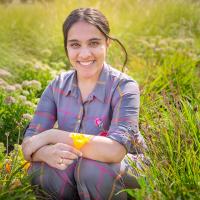Last week, the Simmons community had the privilege of hearing Dr. Ibram X Kendi speak with President Wooten about his book How to Be an Antiracist, which weaves together his journey and the larger history of Black Americans. During this talk, Dr. Kendi emphasized the importance of academic institutions allocating space and resources for students to learn about their history. Hearing this, I felt my blood surge up my throat, words swirling on the tip of my tongue that I couldn’t quite voice. It’s like 18-year-old Saloni was clamoring through the depths of my memory and declaring, “Yeah, this is why you’re at Simmons!”
In high school, I constantly grumbled at the lack of South Asian representation in my curriculum and the (American) world at large. At the time, I remember wondering, “how do I know who I am if I don’t even know where I exist in this society?” I promised myself that I would one day reclaim my history. So, when applying to Simmons, I had some questions:
- “Will I get to learn about my history, or will I only have access to White stories, conventions, and perspectives?”
- “Will I be erased in a sea of White noise?”
If you’re a student of color, maybe you’ve also grappled with these thoughts. And, look, all students fear whether or not they will belong in the community they choose to join. All students face insecurities about their ability to make their voices heard. However, students of color face unique challenges that are exacerbated by the racist policies that created the inequities in contemporary American education. And while I knew I wasn’t going to find a school that was a post-racial utopia, I needed to go where I could name, explore, and submerge in this dissonance.
When would I finally address the gnawing hunger for my own history?
Flash forward to the spring of my first year when I stumbled upon the words of Adrienne Rich in my leadership class. (Shoutout to Dean Norman!) In her essay, "Claiming an Education," she asserts that “responsibility to yourself means refusing to let others do your thinking, talking, and naming for you; it means learning to respect and use your own brains and instincts; hence, grappling with hard work.”
I paused and examined my academic journey at Simmons thus far. Was I on the path to claiming my education? When would I finally address the gnawing hunger for my own history?
Luckily, I go to Simmons, where there are resources at every corner, if you’re willing to look. One such experience available to students is the SURPASs research grant, a paid, mentored summer research/creative scholarship experience for undergraduate students. At first, I hesitated to apply; I thought it was only for STEM projects. However, after extensive conversations with my professors, I realized that I could study anything under the sun, including (gasp) South Asian history.
I applied to study the history of South Asian Americans. I found my mentor, Professor Grossman, enthusiastically supportive of my longing to uncover how South Asian Americans construct their identity against the backdrop of American culture and policy.
Despite COVID, Simmons adapted its plans to ensure that SURPASs could continue this academic year. Each week, I spend a few hours poring over texts about different theories about how South Asian Americans came to this country and where we are going. Though I struggle with moments of doubt, I remember Dr. Kendi’s advice to President Wooten about the goal of young people at schools like Simmons: “To be a leader is to lead change.”
This project allows me to lead myself through my uncertainty and doubt to a space of critical inquiry and self-reflection. I get to sift through and reconstruct the fragments of my history. My research empowers me to own the contradictions of my existence, to stand upon my mess, and say, “I’m trying to figure this out.” And the most intriguing part of this process? I know that I am at the very beginning of a lifelong journey of exploring the nuances of my identity.

Our Woman on Campus, Saloni Kumar ‘23, writes about her experience as a college student, giving us a closer view of the undergraduate culture of Simmons!
Follow her on Instagram.

